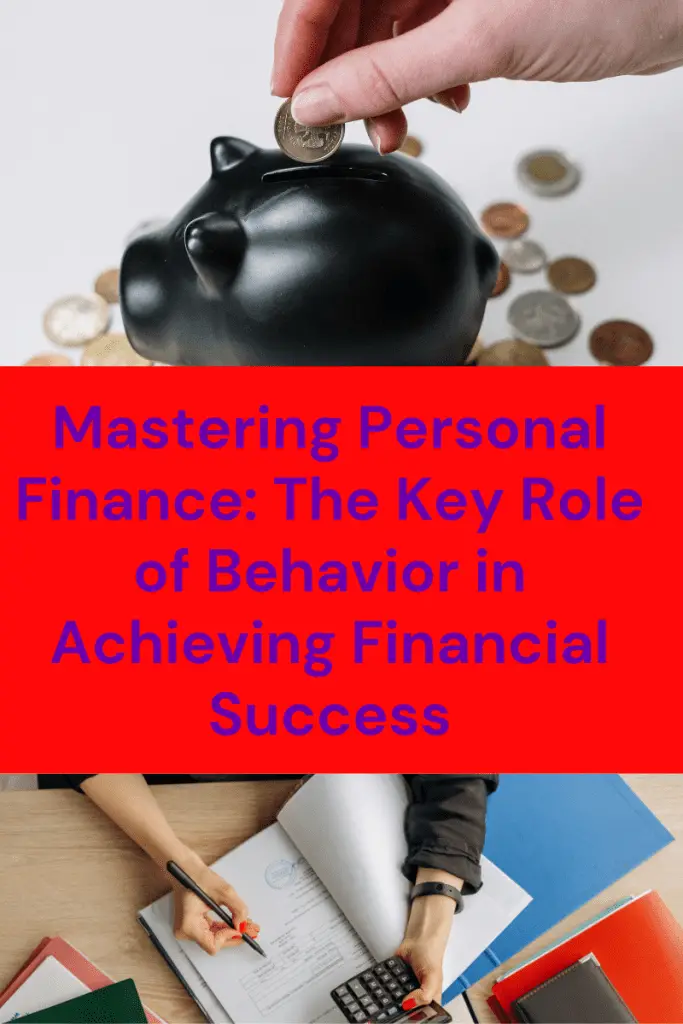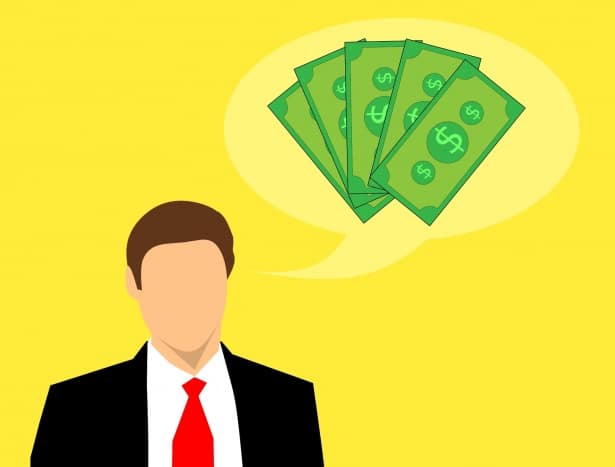Personal finance depends on behavior because financial decisions are dictated by individual habits and attitudes. Behavioral traits determine how one earns, spends, saves, and invests money.
Understanding the critical role of behavior in personal finance is essential for effective money management. Individual behaviors, such as spending discipline, saving habits, and investment choices, shape financial outcomes. The financial path a person follows stems from their unique mindset and daily practices regarding money.
Cultivating positive financial habits is crucial for achieving long-term financial stability and reaching monetary goals. Engaging in regular budgeting, making informed spending decisions, and planning for the future are all part of a strategy influenced by personal behavior. By recognizing and adjusting these behaviors, individuals can take proactive steps towards a more secure financial situation, demonstrating the profound impact that behavior has on personal finance.

Credit: copivault.com
The Psychology Of Spending
Personal finance isn’t just about numbers and budgets. Our spending habits reveal a complex web of emotional motivations and psychological behavior. Understanding the relation between mind and money is crucial. It can lead to smarter financial decisions and better spending patterns. Let’s dive into the behavioral aspects that often dictate the way we handle money.
Emotional Drivers Behind Purchases
Every time we reach for our wallets, a myriad of emotional factors come into play. Emotions drive spending. Joy, stress, excitement, and even social pressures can dictate what we buy. Emotions can make us think we need something when we don’t.
- Stress: Stress shopping, or ‘retail therapy,’ can lead to unnecessary spending.
- Excitement: The thrill of a sale can trigger the urge to splurge.
- Social pressures: Buying to keep up with friends can strain budgets.
- Happiness: Buying experiences or goods can act as mood boosters.
Impulse Buying Versus Planned Spending
Impulse buying and planned spending sit at opposite ends of the financial behavior spectrum. Impulse purchases are sudden and usually driven by emotions. Planned spending involves foresight and self-control. Knowledge of both can prevent overspending.
| Impulse Buying | Planned Spending |
|---|---|
| Quick decision | Thoughtful choice |
| Emotion-driven | Budget-driven |
| Can lead to regret | Leads to satisfaction |
| Often unaffordable | Within financial limits |
Recognizing the signs of impulse buying can help us avoid financial mistakes. Creating shopping lists and setting budgets are tools for successful planned spending. Consistent tracking of expenses enables mindful purchases and reduces the likelihood of financial strain.
Setting Financial Goals
Personal finance success often relies on setting clear goals. Without goals, saving and spending can lack direction. Goals help us plan for the future and assess our current behavior. This blog post will explore why effective goal-setting is crucial for managing personal finances.
The Impact Of Short And Long-term Targets
Setting financial goals is not a one-size-fits-all process. Different goals have unique impacts on our behavior and finances. Short-term targets, like saving for a vacation, provide immediate rewards. They motivate us to make daily changes. Long-term targets, such as retirement savings, require patience and discipline. They shape our long-term financial habits.
- Short-term Goals:
- Create an emergency fund
- Pay off credit card debt
- Save for a major purchase
- Long-term Goals:
- Invest in a diverse portfolio
- Plan for retirement
- Save for children’s education
Behavioral Factors In Achieving Financial Milestones
Behavior plays a key role in reaching financial milestones. Impulse buying, procrastination, and lack of knowledge can all steer individuals away from their financial goals. Developing good habits, like regular saving, investing, and spending within a budget, drives financial success.
| Behavior | Impact on Financial Goals |
|---|---|
| Impulse Buying | Detracts from savings and leads to debt |
| Procrastination | Delays achieving goals, potentially increasing costs |
| Regular Saving | Builds financial reserves, ensuring goal achievement |
Budgeting As A Habit
Budgeting is more than crunching numbers; it’s a daily practice that, much like brushing your teeth, becomes second nature with regular repetition. At the heart of personal finance, your behavior deeply influences how effectively you manage your money. Developing the habit of budgeting sets the foundation for a healthy financial lifestyle. Let’s explore how you can create a routine and overcome mental blockers.
Creating A Sustainable Budgeting Routine
Consistency is the key to budgeting success. To build a budget that sticks, align it with your lifestyle and goals. Start small, focusing on spending categories that most impact your finances. Use tools and apps to track expenses effortlessly and make adjustments as needed. Schedule regular budget reviews – maybe weekly or monthly – to stay accountable. By establishing a scheduled ‘money date’, you turn financial planning into a habit.
Psychological Barriers To Effective Budgeting
Understanding common psychological barriers is crucial for sticking to your budgeting goals. Many people associate budgeting with restriction, which can lead to feelings of scarcity and deprivation. Recognizing these emotions and reframing your mindset is essential. Embrace a budget as a tool for achieving your dreams, not just a belt-tightener. Anticipate challenges such as impulse purchases and find strategies to cope, like waiting periods before making non-essential buys. Remember, building a strong budgeting habit can help break down these barriers over time.

Credit: thegoodnickel.com
Savings And Investment Choices
The way you handle your personal finance shapes your future financial stability. Your decisions regarding savings and investment greatly influence your ability to achieve financial goals. Whether you’re saving for retirement, buying a home, or investing in the stock market, your behavior and preferences play a pivotal role. Let’s delve into how personality traits and risk tolerance, along with behavioral biases, can impact these critical financial decisions.
Personality Traits And Risk Tolerance
Understanding your personality traits helps in making informed choices. Some individuals prefer taking risks for potentially higher returns. Others seek safer options, even if it means lower rewards. Your risk tolerance level can lead to different savings and investment paths.
- Conservative savers might choose savings accounts or certificates of deposit (CDs).
- Aggressive investors may opt for stocks or cryptocurrencies.
Behavioral Biases In Investment Decisions
Behavioral biases can cloud judgment and affect investment outcomes. It’s vital to recognize these biases to avoid costly mistakes. Here are common biases that sway investment decisions:
| Bias Type | Effect on Decision |
|---|---|
| Overconfidence | Tendency to overestimate one’s investment abilities leading to higher risk-taking. |
| Confirmation Bias | Favoring information that confirms pre-existing beliefs, potentially ignoring warning signs. |
| Herd Mentality | Copying what others are doing, which may not always align with individual financial goals. |
| Loss Aversion | Preference for avoiding losses over acquiring equivalent gains, which can hinder growth opportunities. |
Debt Management Strategies
Managing debt is crucial for stable personal finance. Your behavior decides how well you control your debt. Smart strategies can lead to financial freedom. Let’s dive into how behavior impacts debt management.
The Role Of Self-control In Managing Debt
Self-control is vital in avoiding debt accumulation. It’s about making choices that prevent overspending. You need to differentiate between needs and wants. Setting a budget and sticking to it is a clear example of self-control.
Here’s why self-control matters:
- It prevents impulsive purchases that can lead to high-interest debt.
- Investing in savings rather than spending builds a secure financial future.
- Making timely payments avoids late fees and extra interest.
Understanding The Behavior Patterns That Lead To Debt
Behavior patterns, like spending habits, directly influence debt levels. Recognizing these patterns is the first step to change. High debt often comes from regular overspending or not planning for emergencies.
| Behavior Pattern | Impact on Debt |
|---|---|
| Buying without a budget | Increases debt risk |
| Using credit for non-essential items | Leads to unnecessary debt |
| Not saving for emergencies | Forces debt borrowing when unexpected expenses occur |
Changing these behaviors takes time and effort. Start by creating a strict budget. Track where every dollar goes — that’s how you spot bad patterns. Replace them with habits that slowly chip away at debt. For example, instead of dining out, cook at home.

Credit: www.cantechletter.com
Influence Of Social Norms And Peer Pressure
Personal finance shapes your future. Your choices and lifestyle matter a lot. Friends and ads often change what you buy. Let’s explore how social habits can change your money choices.
Keeping Up With The Joneses: A Societal Comparison
The race to match friends can dent your wallet. Fancy cars and big homes might seem needed because others have them. This thinking can lead to more loans and stress.
- Budgets fail when you chase others’ lifestyles.
- Smart goals get lost in buying the latest gadgets.
The Power Of Social Media On Spending Habits
Social media platforms influence your spending. Ads and influencer posts can make you want things. Likes and shares might push you towards quick buys.
Clothes and trips get pricey when they’re just for show off online.
| Without Social Media | With Social Media |
|---|---|
| Spend on needs | Chase trends |
| Less shopping | Buy for likes |
Frequently Asked Questions Of Why Is Personal Finance Dependent Upon Your Behavior
What Percent Of Your Personal Finance Is Based On Your Behavior?
Behavior plays a crucial role in personal finance, impacting nearly 95% of financial decisions and outcomes.
How Does Your Money Personality Affect Your Spending Behavior?
Your money personality shapes your financial habits and attitudes, influencing how you make spending decisions and manage finances. Risk-averse savers might limit spending, while risk-takers may engage in more spontaneous purchases. Understanding your money personality helps in tailoring a budget that suits your financial behavior.
What Is Personal Financial Behavior?
Personal financial behavior encompasses how individuals earn, save, spend, and manage their money and financial resources. This includes habits and decisions affecting one’s financial health and stability.
How Does Finance Impact Your Personal Life?
Finance significantly shapes your lifestyle, savings, and stress levels. Good financial management leads to security and opportunities, while poor handling can cause debt and limit life choices.
How Does Spending Affect Personal Finance?
Your spending habits have a direct impact on your personal finances. Controlling and planning expenditures is essential for achieving financial stability and reaching savings goals.
Conclusion
Managing personal finances effectively boils down to behavioral choices. From spending habits to investment decisions, it’s our daily actions that shape our financial future. Embracing smart money behaviors can lead to a stable and prosperous life. Cultivate discipline, remain informed, and let your behavior drive your financial success.











